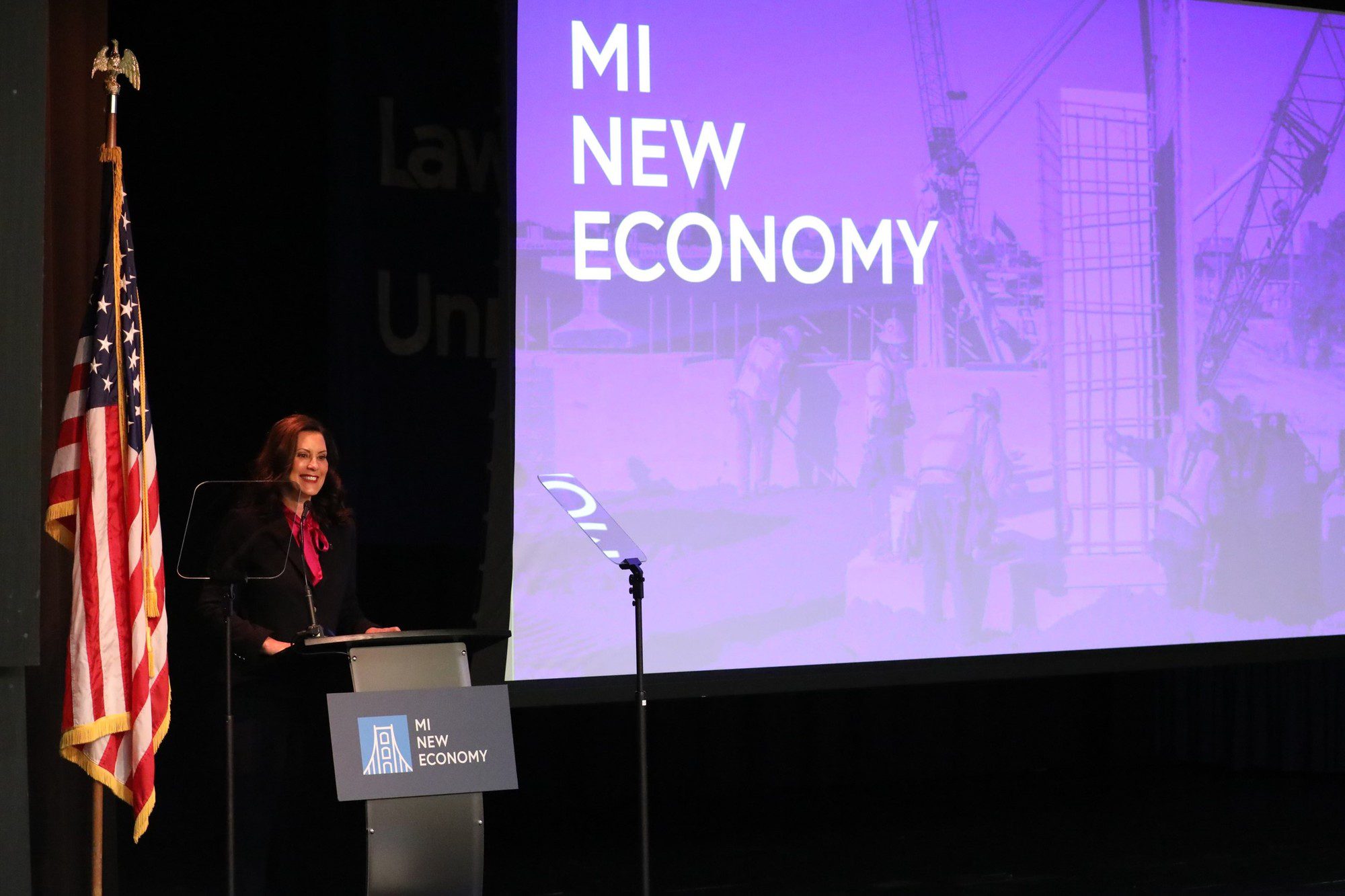Gov. Whitmer Signs Bipartisan Michigan Achievement Scholarship Bill to Lower Cost of College, Celebrate One Year Anniversary of MI New Economy
October 11, 2022
On Tuesday, Oct. 11, the Detroit Regional Chamber’s Vice President of Education and Talent Greg Handel joined Gov. Gretchen Whitmer on stage as she signed the bipartisan Michigan Achievement Scholarship Bill. View a full press release below about this significant legislation.
Michigan Achievement Scholarships lower cost of higher education for vast majority of high school graduates, governor highlights progress on her economic vision
SOUTHFIELD, Mich. – Today, at Lawrence Technological University, Governor Gretchen Whitmer signed bipartisan legislation establishing the Michigan Achievement Scholarship, which will lower the cost of college by thousands of dollars a year for the vast majority of high school graduates. She also joined the Michigan Department of Labor and Economic Opportunity (LEO) to celebrate the one-year anniversary of MI New Economy, her vision to expand economic opportunity and prosperity for all Michiganders. The plan, unveiled last year at the Mackinac Policy Conference, sets ambitious, achievable metrics to grow the middle class, support businesses, and invest in communities.
“Today, I am proud to sign a bipartisan bill to establish the Michigan Achievement Scholarship and lower the cost of college for the vast majority of Michiganders,” said Governor Whitmer. “These scholarships will build on the success of the Michigan Reconnect program and save the vast majority of high school graduates thousands of dollars a year as they pursue higher education at community college, private college, or a public university. We also celebrated the progress we made in the first year of MI New Economy, my vision to expand economic opportunity for Michiganders. I am proud of the progress we have made, and we met our goal to expand access to free or low-cost child care to 150,000 families and are on track to have 60% of our working age population earn postsecondary education or skills training by 2030 thanks to Michigan Reconnect and today’s scholarships. Let’s keep working together to meet the goals of MI New Economy and make Michigan a place where everyone can thrive.”

“These scholarships will allow more Michigan families and students to pay for career training at the school that best fits their individual career goals — whether that’s a trade school, a community college, or a university,” said Sen. Kim LaSata (R-Coloma). “Expanding the eligibility of this scholarship to cover traditional classroom education, as well as hands-on training at a skilled trades academy, is a great way to both strengthen and diversify Michigan’s workforce.”
“This much-needed boost in scholarship support for students across Michigan is truly transformational and represents opportunities for learners of all backgrounds to secure degrees and credentials at the institution of their choice with far less or no debt,” said Rep. Ben Frederick (R-Owosso), Chair of the House Appropriations Subcommittee on Higher Education.
“This appropriations bill represents a major step forward for higher education here in Michigan. While our state still has some catching up to do, Governor Whitmer and I remain in lockstep agreement that we must invest in Michigan’s students and our higher education institutions to achieve global leadership and put our students on the course for global competitiveness,” said Rep. Steckloff (D-Farmington Hills), Democratic Vice Chair of the House Appropriations Subcommittee on Higher Education. “But more than that, as someone who worked in college student services for years, I am proud of the new Michigan Achievement Scholarship and what I know it can do to alleviate the financial stresses of the college experience for many Michigan families. Everyone deserves the chance to have a quality education, and I’m proud we can continue to provide that here in the Great Lakes State.”
Michigan Achievement Scholarship
To make college more affordable for families, grow Michigan’s talent pool, and get the state closer to achieving its Sixty by 30 goal, the governor signed bipartisan legislation creating the Michigan Achievement Scholarship. This legislation builds on Governor Whitmer’s promise in 2019 to pass Michigan Reconnect and Michigan Opportunity Scholarships to reach the state’s Sixty by 30 goal of 60% of adults with a skill certificate or college degree by 2030.
Starting with the class of 2023, high school graduates will be eligible for more financial aid from the state, up to:
- $2,750 if they attend a community college, per year
- $5,500 if they attend a public university, per year
- $4,000 if they attend a private college or university, per year
Students will be eligible if their family demonstrates financial need when they complete the FAFSA. The Michigan Achievement Scholarship will cover:
- 94% of students attending community colleges
- 76% of students attending a public university
- 79% of students attending a private college or university
MI New Economy
Unveiled at last year’s Mackinac Policy Conference, MI New Economy has three pillars: 1) grow the middle class, 2) support businesses, 3) invest in Michigan’s communities. The MI New Economy framework set forth bold, specific goals centered around making investments in Michigan’s people:
- Lift 100,000 families out of working poverty.
- Pursue our 60 by 30 goal to have 60% of Michiganders 25 and up earn a postsecondary degree or skills certificate by 2030.
- Expand access to low or no-cost child care to 150,000 families.
- Become a top 10 state for small business growth, revenue growth, and venture capital funding.
- Build 75,000 new or rehabilitated housing units
- Ensure 100% access to high-speed internet in 5 years.
Since the announcement, Michigan has achieved, or is on track to meet many of the goals.
- In August, Gov. Whitmer celebrated the bipartisan expansion of access to free or low-cost child care for 150,000 more Michigan kids and their families, quickly meeting the goal set by the plan.
- The state is on track to achieving nearly 50% of its 60 by 30 target, up from a previous 45%. LEO Director Susan Corbin shared how her department has worked alongside the governor to help achieve these goals.
- The state is also on track to meet the other goals, with increased internet access for homes, over 16,000 new, affordable housing units over the last year and fewer families working in poverty. According to the latest federal census data, Michigan has lifted approximately 87,000 people above the federal poverty line since 2018.
“Through programs like Michigan Reconnect, Tri-Share and more, we are putting families on a tuition-free path to higher paying careers while eliminating major barriers, like child care, that prevents them from being able to pursue their goals and make ends meet,” said Director Corbin. “The MI Poverty Task Force has also worked to develop a comprehensive anti-poverty plan for Michigan that addresses the root causes of poverty and makes recommendations on ways to lift families into the middle class.”
Gov. Whitmer has continued to build on this work, signing a new bill to establish the Michigan Achievement Scholarship. With $250 million in funds from the FY23 budget, the scholarship will make college more affordable for the majority of Michiganders while also growing the state’s talent pool.
“I applaud our state’s leaders for making such strong investments to support students and families across Michigan,” said Lawrence Technological University President Tarek Sobh. “Thanks to the programs we’ve heard about today and this new bill, thousands more Michiganders now have a path to achieve their educational goals and create a better life for their families.”
Under the program, Michiganders who demonstrate financial need will be eligible for annual financial aid from the state, up to $2,750 at a community college; $4,000 at a private college; and $5,500 at a public university.
The event also featured three panel discussions with local community and business leaders to discuss how the state can continue to make progress on other goals outlined in the MI New Economy plan.
###
Detroit Drives Degrees

Learn more about the Detroit Regional Chamber’s Education and Talent initiatives, including Detroit Drives Degrees.
